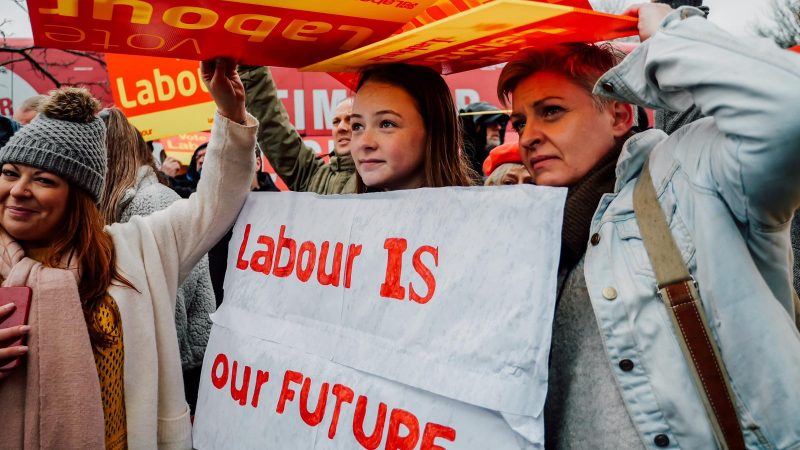
Labour Together has published its report into the 2019 general election defeat. The review seeks to paint a picture of the current state of play for the Labour Party, and sets out recommendations for a way forward to build a winning electoral coalition that will enable us to govern and change Britain.
Among the set of recommendations is a strategy to build an electoral coalition that will support wide-reaching economic changes alongside a “robust story of community and national pride”. This can mobilise existing supporters and younger voters, the report argues, whilst “being grounded in community, place and family to speak to former ‘leave-minded’ Labour voters”.
This leads us to an important finding of the report: that Labour’s current coalition shares much common ground on economic issues but that there was a “much border range of viewpoints on cultural and values-based issues”.
Researchers put various statements to people to determine a set of ‘key values’ most commonly shared among voting groups. Among them was ‘An eye for an eye, a tooth for a tooth’. This statement was opposed by the most socially liberal/progressive elements of voters, whereas it found widespread agreement among others to the right, but also in the ‘mainstream’.
This is an interesting phrase to analyse for a focus group. The philosophy underpinning this can tell us more about the sets of ‘values’ some strategists might suggest Labour adopt, and why there is a danger in following reactionary elements – even to a small extent.
‘An eye for an eye’ will commonly be read as an approach to law and order that is revengeful, rather than restorative. Policies to achieve harsher, more punitive justice systems have been characteristic of the authoritarian right in Europe, including in Hungary, Poland or Germany.
The dangers of appeasing authoritarian instinct is two-fold: firstly, severe penalties for those who violate the law, regardless of whether the law is just or applied equally, can lead to the disproportionate punishment of disadvantaged groups. Authoritarian governments will use the force of the law to exacerbate the oppression of marginalised people, or target those who seek to challenge their rule.
But this does not only apply in authoritarian regimes. For example in Britain today, we can observe the full force of the state come down on migrants who have ‘violated’ the law by committing immigration offences. Locking people up in detention centres – still possible without a time limit in the UK – is violent and lawful at the same time.
Seeking justice in revenge means that punishment must satisfy feelings of anger towards the offender. Migrants in Britain experience violence by the state because large swathes of society have been conditioned to feel anger towards them. They are held responsible for the ills of this society, from crumbling public services to depressed wages. The reactionary right will tell the white British population that an injustice has been committed against them. Something that is rightly theirs – jobs, healthcare, school places, housing – has been taken away by people who it does not belong to. Their identity and material conditions are perceived as under threat. Therefore, those deemed responsible must be punished.
In the Labour Party, we often say our politics are rooted in our values. But what are these values? How can a policy of ‘tough on crime, tough on the causes of crime’ be equated with values of social justice and equality if we do not ask critically which sections of society are served by these laws?
Those who call on Labour to be more pragmatic might think that a nod to reactionary values is a necessary compromise to achieve a broad enough electoral coalition. They might think this is a price worth paying if it means Labour can transform the country with investment in the economy and infrastructure. Some will say that social and cultural conflicts will ease if we only level up.
But a ‘pragmatic’ Labour government cannot structurally transform the country if it is elected on a political platform derived from reactionary values. Values do not exist in a vacuum. They play their part in upholding the economic, social and political structures that govern our society, that determine our relations to each other, in the workplace and outside it.
For example, conceding on the need to control immigration, governments have toughened conditions for migrant workers to access services and jobs. Through these restrictive visa rules, linking workers’ ability to live in Britain to their employers, migrant workers will be less likely to join in the struggles for better terms and conditions. Migrant workers do not automatically drive down wages, it is these forms of border controls that does it.
If we concede to one set of reactionary values, it will be harder to resist others. A focus on ‘the family’ as an anchor of community is also highly problematic. ‘Traditional family values’ can infringe on the rights of women, the LGBT community and others who do not wish to subject to heteronormative living arrangements.
The nuclear family helps to reproduce capitalist modes of production because capitalism relies on the reproduction of the workforce. This is why struggles over the rights of women to enter the labour market, access to birth control and abortion and LGBT rights are all anti-capitalist struggles. The reactionary right does not just attack liberation politics purely on a ‘cultural’ basis, it is in their economic interest too.
The worldview of the ruling class becomes dominant if we accept their beliefs as the logical explanation, their values as the norm and their morals as absolute. The structural transformation that the left aims for cannot be achieved under these conditions. Rather than accepting reactionary values as a given, we need to perceive them as sites of struggle too.




More from LabourList
Downing Street director of communications Tim Allan resigns
‘Treasury ‘Green Book’ reform is a game-changer for left-behind coastal towns’
Over half of Labour members disagree with NEC decision to block Andy Burnham, exclusive polling reveals